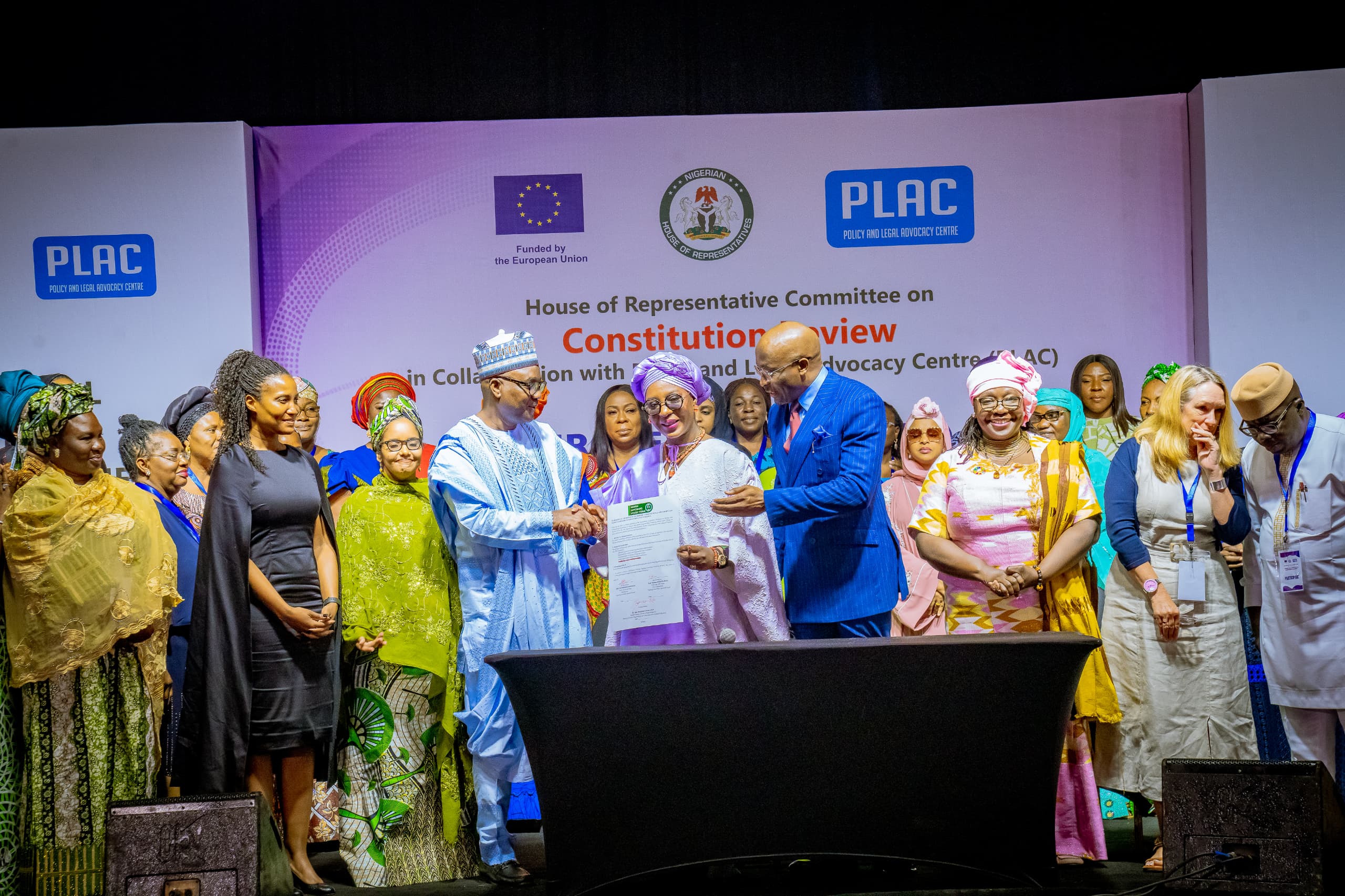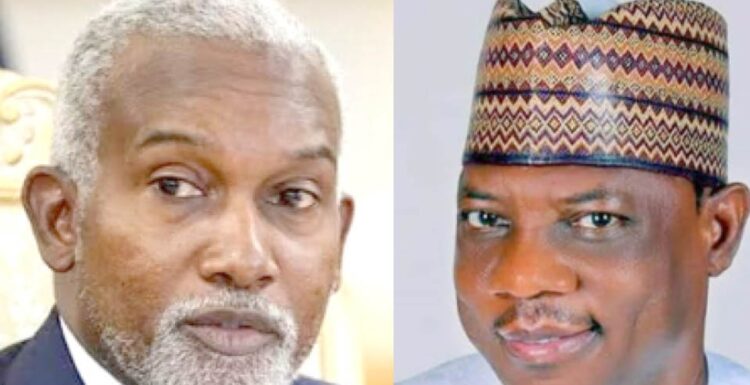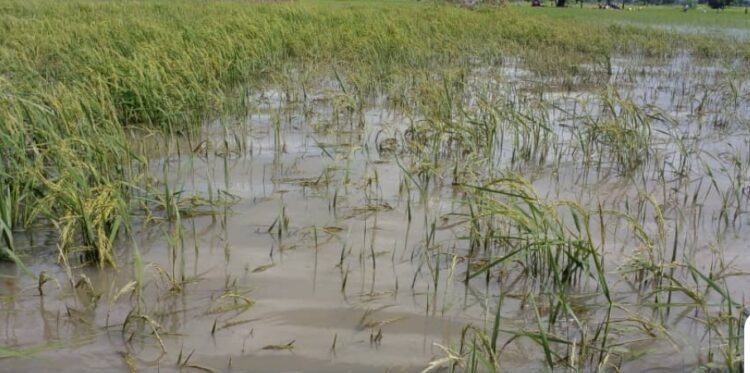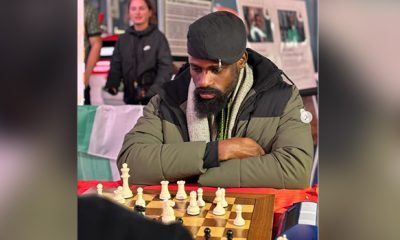News
Constitution Review: Women Empowerment Necessary, Strategic For Economic Growth – Speaker Abbas

News
Femi Ojudu: We Understand His Bitterness Being A Political Coupist– Lere Olayinka bombs Ojudu over comment on wike

Lere Olayinka
SSA (Public Communications and Social Media) to the FCT Minister, has taken Femi Ojudu describing him as a political coupist who misfired.
Hear Olayinka:
” I read a certain comment on the FCT Minister, Nyesom Wike, credited to Egbon Gani Babafemi Ojudu, in which he referred to the FCT Minister as someone who “carries on as though power is eternal, as if position confers immortality.”
“Egbon Femi Ojudu is pained, no doubt, but shouldn’t he limit his frustration to his “I too know” mindset that made him calculated wrongly on the 2023 presidential election?
“By the way, is he now in the farm, cultivating cocoyam and ewedu vegetable as he promised in 2022?
“Funny that someone like Femi Ojudu, who led a Political Coup in Ekiti is now the one sermonising about power not being eternal. Didn’t he know that power was not eternal when he was leading the coup that plunged Ekiti State into a state of emergency?
“At what point did Egbon Ojudu, a political coupist become an advocate of politics of fairness? When he lost his chance to remain in power after his preferred Presidential candidate lost the APC primary election?
“Unlike Buoda Gani Efon Ojudu, Wike has proven to be a better and more successful politician. Wike is not like Egbon Femi Ojudu, whose only major political achievement is deceiving President Obasanjo to remove illegally, a democratically elected Governor of Ekiti State.
“Anyway, I am still waiting for him to confirm or deny that he actually authored the comment though. Until then, let our gunpowder be kept dry.
News
Bauchi gov, foreign affairs minister’s embitterment escalates

The political embitterment between Bauchi State Governor Bala Mohammed and the Minister of Foreign Affairs, Yusuf Maitama Tuggar, has escalated.
This played out in Bauchi on Friday when Deputy Governor Mohammed Auwal Jatau, and Tuggar exchanged altercations during Vice President Kashim Shettima’s visit to the state.
Reports alleged that Jatau slapped Tuggar following a heated exchange over alleged disparaging remarks made by the minister against Governor Bala Mohammed.
Although Jatau has since denied the incident, it underscores the depth of political animosity between the governor and the minister.
Sources said the confrontation happened inside a coaster bus transporting the vice president and other dignitaries from the Abubakar Tafawa Balewa International Airport to the Emir’s Palace for the turbaning ceremony of former Governor Mohammed Abdullahi Abubakar as Makama Babba I of the Bauchi Emirate.
The vice president was in Bauchi for the turbaning event, which also coincided with the wedding of the former governor’s daughter, Hajiya Khadija Mohammed.
Eyewitnesses said the confrontation began when Tuggar allegedly made unflattering remarks about Governor Bala’s administration. The deputy governor, visibly angered, reportedly confronted the minister.
It was believed that but for the swift intervention of Vice President Shettima, the incident would have escalated.
Political observers view the fracas as a manifestation of the long-standing feud between Governor Bala and minister Tuggar.
The minister, a vocal critic of the PDP-led administration in Bauchi, had repeatedly accused the governor of harbouring ulterior motives, particularly regarding the 2027 presidential race.
In January, Tuggar publicly criticised the governor during a live interview on Channels TV’s Sunday Politics, alleging that Bala was using President Bola Tinubu’s tax reforms to launch his 2027 presidential ambition. He claimed the governor lacked sincerity and was exploiting national policy debates for personal political gains.
Responding to the minister’s comments, Governor Bala’s Chief of Staff, Alhaji Aminu Gamawa, dismissed them as “opportunistic and undiplomatic.”
He alleged that Tuggar’s real motivation was his own ambition to run for governor in 2027, accusing the minister of seeking favour with the Tinubu-led government while undermining a “performing governor.” Gamawa further criticised Tuggar for what he called “absentee politics” and said his stewardship at the foreign affairs ministry had diminished Nigeria’s diplomatic standing, especially in Africa.
Analysts speak
The reported incident has drawn criticism from political analysts and commentators who fear the feud could further polarise politics in the state.
Comrade Sabo Muhammad, a Bauchi-based public affairs analyst, described the development as “unfortunate,” warning that such behaviour from senior political figures could incite their supporters and destabilise the political environment.
“They are sending the wrong message to their followers,” he said. “It’s dangerous if political leaders encourage their supporters to resort to violence or disrespect opponents. That kind of politics is unhealthy for Bauchi.”
Muhammad also expressed concern over the optics of the clash, especially given the presence of the vice president, judges, and other dignitaries. “This kind of behaviour may cost Bauchi dearly. The minister has influence at the federal level and could use that to deny the state critical opportunities,” he added.
Another analyst, who spoke on condition of anonymity, condemned the alleged incident as “childish,” saying it was unbecoming of public officials of such high standing. “A deputy governor slapping a minister? It’s disgraceful. No matter the provocation, they should have maintained decorum.”
He urged Vice President Shettima to mediate the dispute and called on Governor Bala to step in to ensure the issue does not spiral out of control.
Yet another political pundit, Muhammad Ibrahim, warned that the incident might damage both politicians’ chances in 2027. “This level of hostility could scare off their principals. If they are already fighting now, who knows what they could do if given more power?” he asked.
Feuds among Bauchi’s political elite
Observers also believe that the Friday’s ‘squabble’ was not unconnected to the permutations for the 2027 governorship election for which both the deputy governor and the minister are seen as front runners to clinch their respective parties’ tickets.
The ongoing spat between Jatau and Tuggar is the latest in a string of political battles involving Bauchi’s elite. Over the last decade, the state has witnessed high-profile political rivalries.
Among the most recent feud was between former Governor Abubakar and ex-Speaker of the House of Representatives, Yakubu Dogara. Another occurred between Governor Bala Mohammed and Senator Shehu Buba Umar. Their falling-out began in August last year during the flag-off of the local government election campaign when Senator Umar criticised the Tinubu administration. A week later, he accused the governor of mismanaging federal allocations and relief materials meant for Bauchi.
Senator Umar publicly challenged Governor Bala to account for the distribution of food items and state finances. That rift has since remained unresolved.
The ongoing conflict between Governor Bala and Tuggar reportedly began in January this year, intensifying after Tuggar’s comments on the president’s tax reforms. The latest incident, involving the deputy governor, is seen as an extension of that feud.
Insiders say the altercation between the deputy governor and the foreign affairs minister is rooted in their individual ambitions to contest the Bauchi governorship in 2027. Both men, despite belonging to different parties, are seen as strong contenders from Bauchi North Senatorial District, a region that has never produced a governor since the return to democracy in 1999.
Jatau, seen as Governor Bala’s potential successor, is said to have taken it upon himself to confront Tuggar in a show of loyalty. On the other hand, Tuggar’s persistent attacks on the state government are widely viewed as strategic moves to secure the APC governorship ticket through President Tinubu’s influence.
Observers say both men see 2027 as a golden opportunity for Bauchi North and are keen to assert their dominance early. This, their rivalry is made more intense by their shared geopolitical base and conflicting party loyalties.
Tuggar Foundation DG declines comment
Efforts to reach the Director-General of the Tuggar Foundation, Alhaji Uba Nana, for comments were unsuccessful, as he did not respond to calls or messages.
Deputy governor denies slapping minister
In a swift rebuttal, Muslim Lawal, spokesperson for the deputy governor, denied that any physical confrontation took place. “As far as my principal and the Bauchi State Government are concerned, nothing like that happened,” he said.
He insisted the allegation was baseless and pointed out that no one could verify it since the alleged incident was said to have occurred inside a bus transporting top government officials, including the vice president.
“Nobody can prove it. The bus was only boarded by the vice president, the governor, and other senior officials. It’s just a rumour,” Lawal said, adding that the deputy governor is “a peace-loving and respectable politician” who would never act in such a manner.
News
Flood kills 3, damages over 10,000 hectares of rice farms in Niger

Three people have died and more than 10,000 hectares of rice farms have been destroyed following a severe flood in Mokwa Local Government Area of Niger State.
The flood, believed to have resulted from the release of water from the Jebba hydroelectric power dam, has wreaked havoc on several farming communities, washing away crops ready for harvest.
Abdulrahman Abdulkadir Wuya-Kede, President of the Kede Youth Development Association, said his three-hectare rice farm was among those affected.
“All the farms were ready for harvest. Some had even started harvesting when the flood struck. We don’t understand why the water was released without proper communication with the communities,” he said.
Another victim, Abubakar Ndako, described the incident as catastrophic, urging the authorities to intervene urgently.
“Lives, capital and hard-earned investments have been lost-most of which cannot be recovered. Farmers from across the country-Kebbi, Sokoto, Kano, Maiduguri-had migrated here for dry-season farming. Now, many are left hopeless,” he said.
The communities had resorted to dry-season irrigation farming after suffering similar flooding during the last rainy season.
Confirming the incident, Dr Ibrahim Audu Hussaini, Director of Information and Special Duties at the Niger State Emergency Management Agency (NSEMA) said the three deaths occurred when a canoe capsized while attempting to cross a flooded river.
He said the agency is still assessing the full extent of damage to homes and farmlands.
-

 News2 hours ago
News2 hours agoBREAKING! Pope Francis is dead
-

 News17 hours ago
News17 hours agoIsrael’s remote controlled bulldozers breaking ground in Gaza war
-

 News7 hours ago
News7 hours agoRetirees with outstanding loans may lose property – FG
-

 Sports20 hours ago
Sports20 hours agoBREAKING! Arsenal hammer relegation Bound Ipswich 4-0
-

 Sports19 hours ago
Sports19 hours agoEPL Results: Chelsea Boost UCL Hopes, Arsenal Win Big, Man United Lost
-

 News17 hours ago
News17 hours ago70-hour Chess Marathon: Onakoya reportedly breaks record set by Norwegians
-

 News7 hours ago
News7 hours agoSad as hotelier slumps, dies at wife’s 60th birthday thanksgiving
-

 Metro8 hours ago
Metro8 hours ago77-year-old Nigerian Uber driver shot dead in US, passenger in critical condition






